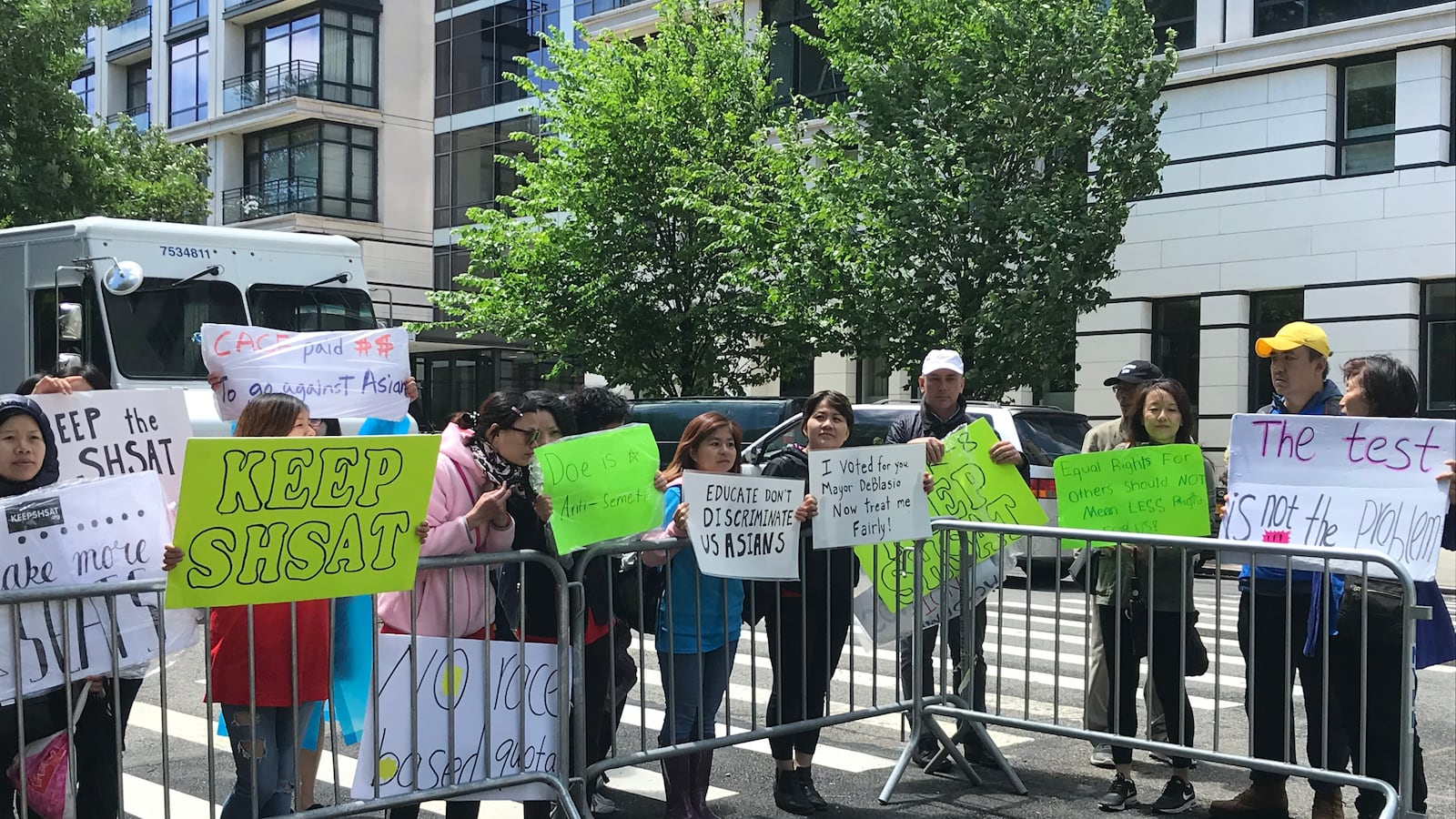Mayor Bill de Blasio and Chancellor Richard Carranza met with members of the Asian community inside Gracie Mansion on Thursday to discuss his plan to overhaul admissions to the city’s specialized high schools, while just outside advocates opposed to a central feature of the plan rallied.
Meanwhile as the legislative session winds down in Albany, the mayor’s proposal was endorsed by the state’s 63-member Black, Puerto Rican, Hispanic, and Asian caucus — significant support for a controversial bill that has barely moved since it was first presented last year. The mayor welcomed the endorsement and “looks forward” to working with the caucus on scrapping the test, said spokesman William Baskin-Gerwitz in a statement.
“As a body, we are committed to efforts that will increase diversity within our K-12 schools,” said a news release about the caucus’s end-of-session priorities. “Thus, we advocate for legislation that achieves this goal, and support local school efforts to eliminate barriers to increased diversity, such as the Specialized High School Admissions Test.”
It’s unclear if the caucus’s support, which came just days before the session is scheduled to wrap up, will change the fate of the mayor’s bid to increase integration at the specialized schools by doing away with the SHSAT, the exam that solely governs admissions. But it’s among several shifts this session that signaled some legislators’ willingness to deal with the matter after they remained largely silent over the past year.
The contentiousness of the bill was evident outside of Gracie Mansion Thursday. Many at the rally complained that the mayor’s meeting, which wasn’t open to the public, was an apparent last ditch effort to sway the opinion of some members of the Asian community.
“The mayor has never had any panel discussions with our communities in earnest,” said Chien Kwok, a parent who attended the rally. “He always pre-selected his people like he’s doing now — leaving out the people who don’t make him look good.”
Kwok said he and other protesters were there to make their voices heard despite being “shut out of this one-sided meeting.” Inside, over roughly two hours, parents and community organizers expressed disappointment to de Blasio, Carranza, and other city officials over how the proposal was rolled out, according to Yiatin Chu, a supporter of the SHSAT who was in attendance.
The mayor apologized to the room for “any feelings that were hurt by the way they conducted the process,” Chu said.
“What we heard around the table from many people in the community is the need to be very vocal and very public with an apology to the Asian community — which we have not seen,” Chu said.
Chu felt the opinions in the room skewed heavily in favor of the mayor, a sentiment she expressed to the chancellor.
“I said that there are fewer parents sitting around this table than there are organizations that obviously get funding from you,” she said.
Among the groups invited were Keep SHSAT, Chinese American Planning Council, Chinese American Justice Alliance, Coalition for Asian American Children and Families, and Chinese American Citizens Alliance Greater New York.
“Just because they have Asian in their name and just because they have a conduit to speak their mind, they don’t represent Asian parents of the communities that I am engaging in,” Chu continued.
But Jason Wu, an attorney for the Legal Aid Society who attended in his own capacity, disagreed. He said the attendees who support the test “kept repeating” their viewpoint, cutting into time others wanted to use to address other education issues, such as reducing class sizes.
“So a lot of the focus of the meeting was on the SHSAT, but I think for many of us who care about race equity and educational equity, many of us wanted there to be more robust engagement with real policies,” Wu said. “And I feel there was a missed opportunity in this meeting today to rigorously engage with the policy issues.”
Several of the people who attended the meeting declined to speak with Chalkbeat as they exited about what they had heard. Others, like Shino Tanikawa, who serves on District 2’s Community Education Council, were invited and chose not to attend.
City officials, including the mayor and chancellor, didn’t speak specifically about the negotiations happening in Albany, according to Chu, but did intimate that they planned on continuing conversations with community stakeholders.
“Our city works best when diverse stakeholders are at the table,” Baskin-Gerwit said in a statement. “The mayor has enormous respect for these leaders and the communities they represent. He wishes he had sat down with them sooner.”
David Rem, the father of a Latina student who will attend Stuyvesant in the fall, said he came to the rally to protest against de Blasio’s proposal which he views as “racist and divisive.”
“The way the mayor’s going about the program is saying to your brown and your black kids that you’re not smart enough to pass the specialized high school test,” Rem said. “But these kids are talented. They need the resources, they need the prep from gifted and talented that will help them pass the test. The mayor is unwilling because he wants a quick fix.”
The mayor and chancellor reportedly floated the possibility of scrapping the SHSAT in favor of expanded gifted and talented programs. However, Assembly Speaker Carl Heastie told New York Post that he wouldn’t agree to any “horse trading.”
Correction: An earlier version of this story misstated the timing of a state budget deal; it was reached in March.

